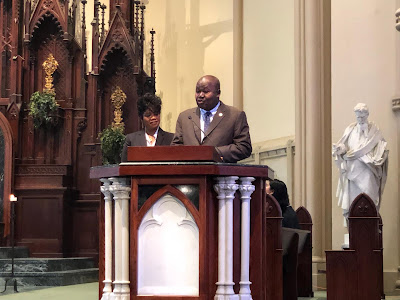I am honored this week to preach one of the days of the Saint Francis Xavier Novena at Saint John's Church in Worcester. This is my homily.
If you, like me, have been making the Saint Francis Xavier Novena for decades, you have heard the stories many time. The story of the three room mates at the College of Saint Barbara in Paris: the skeptical Francis Xavier, the idealistic Peter Faber and the old devout soldier, Ignatius of Loyola.
You have heard, perhaps of the arguments between Francis and Ignatius, and how slowly, by accompanying his younger brother, Ignatius won over and made a disciple of the hot tempered skeptic, and how this young society came to be defined by their dedication to prayer, penance and the humility, born of the Cross.
And then you have, no doubt, heard about Saint Francis Xavier’s Missionary work in India and his plans to evangelize Japan. But I’m willing to bet you have not heard the stories of what happened in between the conversion of the reluctant room mate and his first missionary journey to Boa: it’s the story of a hospital and a poor house, that formed a missionary’s heart.
The first story dates from the year of Francis’s ordination, as six of the company arrived in Venice, determined to serve the poor in two hospitals in that city. Francis was assigned to the Hospital of the incurables, where he found himself repulsed by the stench and the ugliness of the place. One of his biographers describes the scene:
“He was to be the servant of all here, to wait upon the sick, dress their wounds, sores or ulcers, make their beds, prepare their food, sweep the room, and the like, and was also to take care of their souls, instructing them, consoling them, preparing them for the last sacraments, and, after their death, csarrying them forth for burial.”
The biographer continues:
“It was here in Venice that he won the grace, never to find any wound or ulcer, however loathsome in itself, a cause of horror or disgust to him. The grace, however, was won by a signal victory over his natural delicacy, when, finding a great and sickening repugnance rising in him on having to dress an ulcerous wound of the most disgusting kind, he forced himself to lick it and [drain its’ toxic substance] with his mouth.”
A second story from those days was of the arrival of a dying leper at a moment when all the beds of the hospital were full. One of Francis’ companions demanded that the man be placed in a bed with him. The next day this brave member of the company woke with the first sign of leprous sores on his body. In a miracle later attributed by some to Saint Francis Xavier, the sores disappeared within a day.
A contemporary biographer described the humility, piety and zeal which the members of the company demonstrated while caring for the sick in these words: “They often had no shelter for the night, and were sometimes whole days without food except the cones of pine trees….the ferrymen at the rivers refused to take them across without payment; they sometimes had to give their shirts or their inkstands in lieu of payment. [on one particularly difficult day] one of the brothers had to get leave to pawn his breviary to [gain passage for the others].” The biographer goes on the describe Saint Francis walking through the market, “humbly begging from one an apple, from another a radish and some other vegetable.”(2) All so they could serve the sick.
The second story occurred three years later, in Rome, where Father Francis had been sent to preach to and serve the people of the Church of San Lorenzo in Damaso. Within a year of his arrival, a severe famine broke out and thousands died from hunger or disease. Among the few to help them were the the Jesuit companions. An early biographer describes the scene:
“They were seen by many carrying on their shoulders those too weak to walk, to get them fed and clothed in their house, giving their mantles to their guests, washing their feet, and attending them in sickness. In this way [they] sheltered more than four hundred poor people from the biting winds of a Roman winter, which often rush across the Campagna from the peals of the Sabine mountains. Such disinterested charity soon attracted notice, and the nobles began to send so much money and food that the Fathers were able to assist three thousand poor people until the next harvest, besides giving them religious instruction and inducing them to lead better lives in the future.”(3)
These simple stories of the newly ordained Francis Xavier are dwarfed by the dramatic tales of his missionary work in India, Japan and (almost) China. But they are testaments to how the heart of the missionary was formed in his caring for the sick and the poor.
We are told that one of Saint Francis Xavier’s most popular sermons was on today’s Gospel of the Last Judgement, and I wonder what he was remembering when he would read these words:
“…I was hungry and you gave me food,
I was thirsty and you gave me drink,
a stranger and you welcomed me,
naked and you clothed me,
ill and you cared for me,
in prison and you visited me.'
…’Amen, I say to you, whatever you did
for one of these least brothers of mine, you did for me.’"
____________
1 - Henry James Coleridge, The Life and Letters of St. Francis Xavier, Volume 1 (Burns and Oates, London, 1872). page 41.
2- Ibid.
3- M. T. Kelly, A Life of Saint Francis Xavier Based on Authentic Sources. (Herder, Saint Louis, MI, 1918). page 55.
















